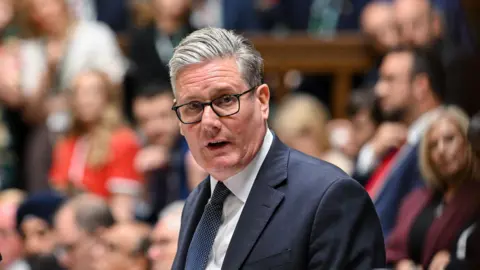Badenoch and PM spar over 'modest income' tax pledge
 House of Commons
House of CommonsKemi Badenoch and Sir Keir Starmer have clashed over a cabinet minister's promise that people on "modest" incomes will be protected from tax rises.
Transport Secretary Heidi Alexander made the pledge when interviewed on Sunday about possible hikes at this autumn's Budget.
Since then, ministers have tied themselves in knots when asked who this covers.
Speaking at Prime Minister's Questions, Tory leader Badenoch said Sir Keir "doesn't know" what the answer is.
The prime minister defended the government's record, and accused the Conservatives of delivering "stagnant" economic growth over 14 years.
Labour promised in its election manifesto to protect "working people" from tax hikes - an assurance that dominated the run-up to last year's Budget, as ministers struggled to spell out who they meant.
On Sunday, Alexander complicated the picture still further by suggesting in a Sky News interview that "people on modest incomes, working people" would be shielded from rises this time round.
During PMQs, Badenoch called on Sir Keir to "clear up the confusion," adding that ministers "seem incapable of explaining who is in that category".
In response, the prime minister said the government was "fixing the country" for "the sort of people that work hard but haven't necessarily got the savings to buy themselves out of problems".
"That's who we're working for, and that's why we put the national living wage up, that's an extra £1,400," he added.
Tax pledges
The government is widely expected to raise taxes at this autumn's Budget, after poor economic figures and a series of U-turns on welfare cuts made it harder to meet its self-imposed spending rules.
Ministers have repeatedly insisted they cannot write the Budget in advance, whilst at the same time promising not to raise the biggest revenue-raising taxes available to the Treasury ahead of the next general election.
These include income tax rates; VAT, a sales tax; and corporation tax, which is paid by companies on their profits.
Labour also promised not to raise National Insurance - prompting a row last autumn when it announced a rise in the contributions paid by employers.
It means ministers could be in for a long summer, as they are repeatedly pressed why they cannot rule out rises on other areas.
'Working person' wrangle
Recent reports have suggested ministers are considering freezing income tax thresholds beyond the 2028 date fixed by the last government, allowing more people to be dragged into higher bands as their wages rise over time.
Ministers are also facing pressure from some Labour backbenchers to consider some sort of additional tax targeting wealth.
During PMQs Badenoch accused the government of also "considering taxing" pension contributions, although she did not explain what she meant by this.
Labour ministers have previously come up with a wide range of definitions for who would qualify for tax protection as a "working person".
Ahead of last autumn's Budget, the prime minister said the category included those who "go out and earn their living" and can't "write a cheque to get out of difficulties".
He added that those with additional income from assets, such as shares or property, would not come under his definition.
His spokesman later said those with a "small amount of savings" could qualify under the prime minister's definition, and those holding stocks and shares in a tax-free Individual Savings Accounts (ISA).

Sign up for our Politics Essential newsletter to keep up with the inner workings of Westminster and beyond.
